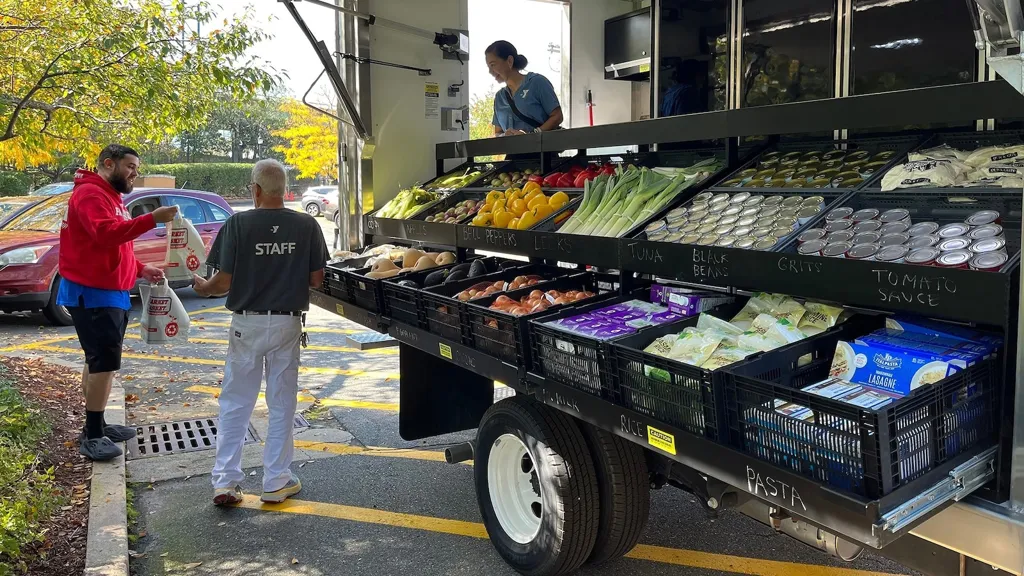The benefits for low-income households will discontinue in FY 2026.
Those who will be affected by the termination of the Supplemental Nutrition Assistance Program-Education (SNAP-ED) expressed anger saying that politicians, such as President Donald Trump and Republicans in Congress, seem to underestimate the value of public health.
With Congress passing the One Big Beautiful Bill Act in July, the law is set to roll back SNAP benefits beginning Oct. 1, the start of the 2026 fiscal year, limiting monthly financial assistance to low-income households to purchase groceries and healthy foods. The act also effectively terminating SNAP-ED -- programs that teach families about healthy-meal preparation and physical activity.
Republicans -- including Trump -- have claimed cuts through the One Big, Beautiful Bill Act are targeting "waste, fraud, and abuse" in the entitlement programs and would save hundreds of billions of dollars over the next decade.
YMCA Boston Nutritionist Kelsey Davis uses SNAP-ED funding to educate Boston residents -- from toddlers to retirees -- on how they can improve their health and food security on limited budgets. Davis said she hosts healthy-food cooking classes, distributes produce through a mobile marketplace truck and answers questions about nutrition for those with chronic diseases such as diabetes.
"I have a little anger when I think about people not seeing the value in public health and recognizing that not everybody comes from the situation that you come from," Davis told ABC News. "I'm angry that we're not more sensitive to people's situations and dedicated to helping them."
Davis also teaches her students how to read food labels, understand serving sizes and daily value percentages for foods.
Jerold Mande, chief executive officer of the non-profit Nourish Science and a former senior advisor on food and nutrition for former President Barack Obama, led the charge to implement the Nutrition Facts Label seen on most food products in the U.S. today when he was with the Food and Drug Administration in the early 90s.
"Most Americans have a very poor-quality diet -- 86% get a failing score -- and indeed, more than half of Americans are sick and almost a third of our kids," Mande told ABC News. "Under our current system, you know, without knowledge to read the labels and pick the healthier foods, our food will make you sick."
SNAP-ED, as it looks today, began in 2010 as part of former first lady Michelle Obama's Healthy, Hunger-Free Kids Act, an obesity-prevention, nutrition-education grant program, according to Mande. The federal government distributes $550 million nationwide for SNAP-ED benefits to states across the country.
In the U.S., 16 states with the highest number of SNAP-ED funds receive at least $10 million, Mande said. Eleven of those states voted for Trump in the 2024 presidential election.
"There was no hearing that was ever held on it in the Congress before they did this. There was no debate on the floor whether they should even do this. It was just wrapped up into this big, big bill," Mande said. "It just means that this whole concept of Make America Healthy Again is not going to be available for low-income people."
Davis and the YMCA Boston use a hyper-localized approach -- entrenched in their communities, incorporating themselves into the cultures of local residents -- often exchanging healthy recipes with the people they are helping.
Davis said that the YMCA's nutrition programs will have enough funding through the 2026 fiscal year -- without federal dollars -- but doesn't know how they'll fund the program after that.
Davis described a 7-year-old girl in one of her classes who took her SNAP-ED cooking course very seriously because she had to make dinners for her and her 3-year-old brother while their parents worked.
"She had come to me and said, 'You know, I recreated your [turkey-meat taco] recipe at home, and my parents let me use the stove, and I cooked for my family,'" Davis said. "And just knowing her and how hard her parents work, you know, working multiple jobs for them to come home to a meal -- unbelievable."
